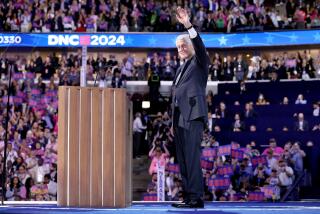Clinton Avoids Partisan Politics on Visit to N.H.
- Share via
CONCORD, N.H. — President Clinton came to New Hampshire on Friday on his first political trip of 1996 and almost utterly avoided politics.
In visits to schools, an arts center and an aerospace plant, Clinton studiously ignored the intense competition for the Republican primary here and barely mentioned his own desire for reelection.
Instead, he focused on hailing improvements in the New Hampshire and national economies in his three years in office and the importance of education in the evolving economy of the future.
“Four years ago when I was here the unemployment rate was over 7%; today it’s almost down to 3%,” he said. “So what we have to do is to take this energy that’s out there . . . and figure out how to spread those opportunities to everyone.”
Clinton was thus following a script written months ago that calls for him to spend the early months of 1996 being “presidential” and rising above mere grubby politics.
It is a luxury allowed by Clinton’s lack of a Democratic challenger and the more-than-adequate job his GOP rivals are doing of beating up on each other.
Clinton timed his two-day visit to take advantage of the large press contingent already in place to cover the GOP bloodletting. He’ll be back in the state the weekend before the primary.
Among the GOP candidates, former Tennessee Gov. Lamar Alexander was on the attack in New Hampshire, bashing publishing magnate Steve Forbes over his wealth. Meanwhile, in Iowa, Forbes and Texas Sen. Phil Gramm traded barbs.
Clinton managed to steal a bit of the limited air time on New England television stations, although he offered little in the way of political passion.
His major speech of the day, at the Concord Center for the Arts, was “presidential” almost to the point of dullness. He recited most of the themes from his State of the Union speech, rousing the crowd of about 800 students, teachers and parents to applause.
Clinton made a passing nod to New Hampshire’s role as kingmaker in presidential politics early in the speech--although he is a notable exception. He is the only president to be elected without first winning the New Hampshire primary since 1952--when politicos identified the primary as a key contest. He finished second in the 1992 Democratic primary.
“Four years ago, I think the most valuable experience for me in New Hampshire,” he said, “was not just surviving and going on to be nominated and win, but what I learned about America from the people of New Hampshire.”
He added that “genuine dialogue” of town meetings and quiet conversations “rebuke the loud slogans and the harsh conflicts and so much of modern political life which sheds more heat than light.”
Most of the speech concerned the importance of education in preparing the next generation for the technology-driven economy of the 21st century. He returned to the theme at the Lockheed-Sanders defense electronics facility in Nashua, where he discussed the administration’s school-to-work job training programs.
*
He never mentioned his Republican rivals nor did he appeal for votes. “The president is president, not a candidate,” said Harold M. Ickes, White House deputy chief of staff and de facto campaign manager.
Clinton did, however, feel compelled to appear in New Hampshire to extol the accomplishments of his three years in office, although he did not answer his Republican critics directly.
Sen. Bob Dole predicted as much Thursday in Nashua when he said, “President Clinton thinks he can talk right and govern left. He’ll probably come up here and sound like Ronald Reagan.”
The central point of Clinton’s New Hampshire appearances was that despite improvements in the overall economy, many Americans remain anxious about their personal futures.
Aides said that attempting to explain and resolve this contradiction will be the “touchstone” of the Clinton reelection campaign.
Among the Republicans, Forbes seemed to be the target on Friday for GOP rivals. Alexander said the multimillionaire publisher couldn’t win a mayoral race without his family’s money.
In Iowa, Gramm cited Forbes’ support for a national health care plan 23 years ago as evidence that the publisher is out of step with Republican voters. The plan called for nationalized insurance run by a federal health security board.
Forbes, also in Iowa, said that he did briefly support the plan--when he was 25 and just out of college.
But “I realized very quickly that would be a disaster and so, for the past 20 years, I’ve been fighting government encroachment,” he said.
More to Read
Get the L.A. Times Politics newsletter
Deeply reported insights into legislation, politics and policy from Sacramento, Washington and beyond. In your inbox twice per week.
You may occasionally receive promotional content from the Los Angeles Times.









